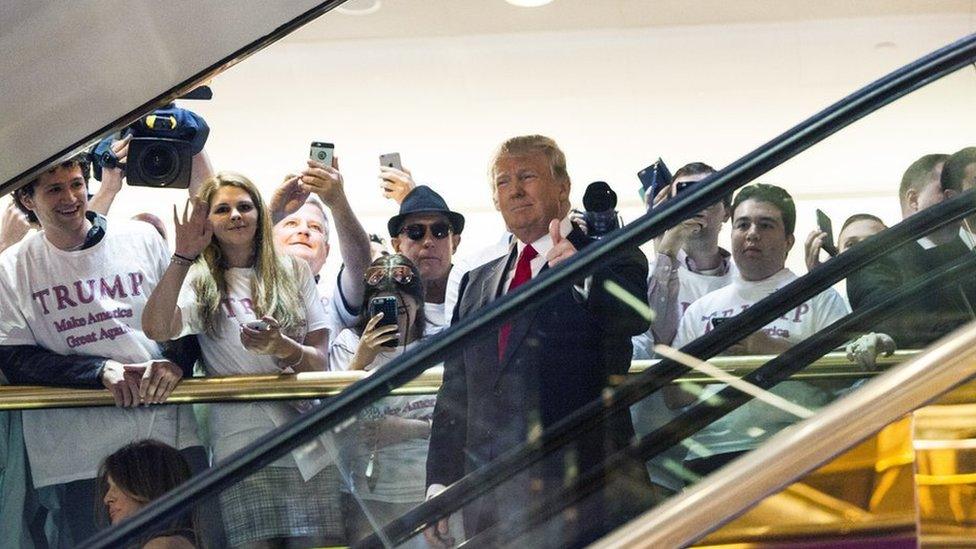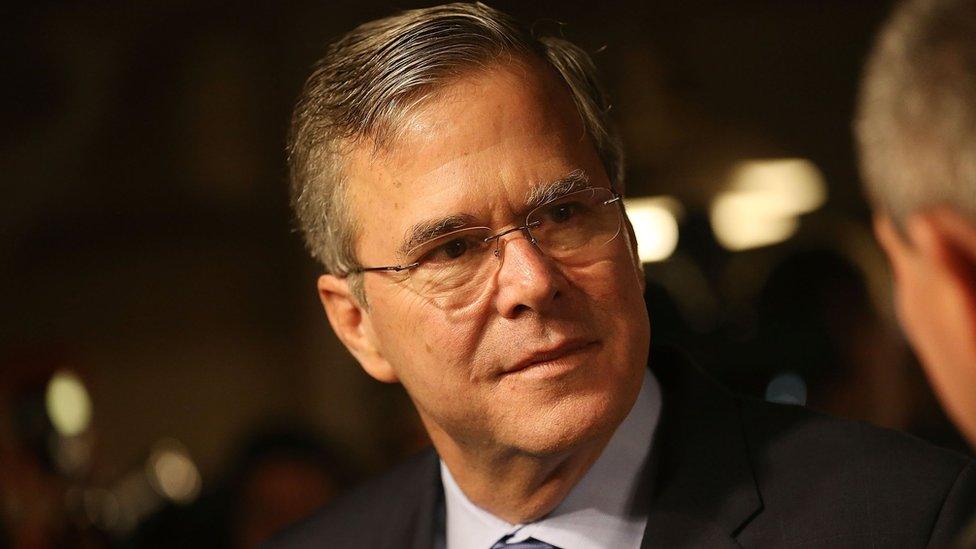The day Trump ran for president (and what people predicted)
- Published

Donald Trump made his entrance via a golden escalator, Melania just in front of him
When Donald Trump descended the golden escalator to announce his run for president, none in the sceptical media pack below could have imagined he would win.
It was on this day four years ago - at the exact same stage of the last US presidential cycle - that Mr Trump made his announcement: he would, for real this time, run for the highest office in the land.
The property mogul and TV host was the 12th candidate to come forward to try to claim the Republican Party's nomination.
If the Washington establishment was sceptical, it was because this was not the first time he had floated a run for the White House, only not to follow up on his own speculation.
Many of the reports that day reflected those doubts. Many of them, employing a degree of mockery rarely used in news, denigrated his performance at the podium inside the gilded Trump Tower. Some of them, though only some, focused on his claim Mexico was sending "rapists" over the border.
What did commentators that day fail to understand about the man who would be president? And what did they get right?

'He seems like he means it' - BBC News
What we said in 2015
"Donald Trump is actually running for president," our North America reporter Anthony Zurcher wrote. "Few people expected it to happen - he's gone through the motions many times before - and his political rants up until now have been roundly derided as a joke. But this time he actually said the words, and he seems like he means it...
"He's already proven a willingness to take swings at his opponents. Jeb Bush and Marco Rubio 'don't have a clue', he said in his announcement speech. 'How are these people going to lead us?' he asked.
"If he says that enough times during a debate - or in a multi-million dollar television advertising spree - a lot of people are going to stop laughing and take notice. And that's probably just what Mr Trump wants."
Donald Trump: 'We will make our country great again'
How does that view look now?
"Donald Trump got people to take notice all right, but I never thought someone with negative ratings as high as his could capture the nomination," Anthony writes in 2019. "I figured the Republican establishment would coalesce around an alternative - and it never really did.
"There's a theory that Trump's presidential campaign was a publicity stunt gone awry, a real-life version of The Producers, where an enterprise designed to fail became an accidental success.
"Only Mr Trump knows the truth, but his pugilistic brand of politics capitalised on a moment in American history when just enough voters were fed up with the status quo to take a chance on an unlikely outsider."

'Much-needed seriousness' - Democrats
What they said in 2015
"Today, Donald Trump became the second major Republican candidate to announce for president in two days," Democratic National Committee (DNC) spokeswoman Holly Shulman said in a statement that proceeded to lay on the sarcasm in spades.
"He adds some much-needed seriousness that has previously been lacking from the GOP field, and we look forward to hearing more about his ideas for the nation."
How does that view look now?
Neither the DNC nor Holly Shulman responded when asked how they viewed those comments now.

Trump may have an opening - Washington Examiner
What they said in 2015
Days before Mr Trump's announcement, Byron York wrote in the conservative Washington Examiner that the mogul could appeal to Republican voters, external tired with the direction the party was taking.
"It's been clear for quite a while that some conservative voters are so disgusted with the GOP that they would entertain the notion of a third party," he wrote.
"If he pursues a race seriously, Trump could win the support of those I've-had-it-up-to-my-eyeballs voters. Their concerns aren't a joke. If Trump doesn't address them, somebody else will."
How does that view look now?
The fact Mr Trump was not an establishment politician, and could shake up the system, was a factor his supporters went on to regularly cite for why they loved him.
Here's what some of his supporters told us in summer 2016:
Why they love Trump: 'He's not a politician'
Four years on, there is no question that the Republican Party has been shaped in the image of the man who led it to the White House: more hardline and more aggressive.
Former Ohio governor John Kasich, who was the last Republican candidate standing alongside Mr Trump in 2016, said in May that it was now the Trump party. "Ninety percent of the Republican Party supports him," he told CNN.

All eyes on the primaries - New York Times
What they said in 2015
Correspondent Maggie Haberman predicted Mr Trump's campaign would end, external with him not winning the nomination (and instead earning a nice fat cheque for the next season of The Apprentice).
But she also anticipated intriguing times ahead in the crucial early states in the Republican primary race.
"He would likely have to somehow outperform both Jeb Bush and Marco Rubio in Florida, where he is a part-time resident," she wrote. "If Mr Trump could buy a state with an early nominating contest, like New Hampshire, and brand it with his name, it might help."
Anyone suggesting Mr Trump could win a primary at this stage was... a lone voice, shall we say.
How does that view look now?
Well, The Apprentice did return, but Mr Trump was a bit too busy to host it by that point.
As far as the primary race was concerned, Maggie Haberman was right - his win in New Hampshire in the second primary gave him a critical boost.
After that, he didn't look back. And by the time of the Florida primary in March 2016, his momentum did help him outperform Marco Rubio and Jeb Bush (who had by that point withdrawn from the race) - Mr Trump won 45.7% of the vote there.

Trump could dominate debate - Washington Post
What they said in 2015
Trump the performer could take up all the oxygen of the other candidates, predicted Chris Cillizza, now of CNN.
"He will interrupt, bully and seek to dominate, external the debate in ways that will make it impossible to get a word in edge-wise," he wrote. "And, if past is prologue, the sorts of things he does say when he gains control of the debate floor will be stuff that appeals heavily to the Republican base and turns off, well, almost everyone else...
"While it's possible Trump's poll numbers collapse between now and August, that doesn't seem very likely since much of how you perform in national polling at this point is a function of pure name recognition, and Trump has plenty of that."
How does that view look now?
Even though the Trump campaign didn't launch until mid-June, analysis shows his campaign was the second-most covered news story of the year, external on US television networks in 2015. No other candidate - apart from the Democrats' Hillary Clinton - was anywhere close.
When the first Republican debate rolled around in August 2015, all the headlines were about him and what he said (in this case, he refused to withdraw comments he had made denigrating women). He would continue to dominate the news agenda all the way through to the election.

Trump's 'pretty sexy' message - Fox News
What he said in 2015
Republican media strategist Adam Goodman predicted Mr Trump's status as an outsider billionaire who was "unashamed" about his wealth could prove attractive to voters.
Appearing on conservative channel Fox News on the day of Mr Trump's announcement, he told broadcaster Gregg Jarrett that Mr Trump was "talking to the disaffected" American, external.
In prescient comments, he discussed how Mr Trump's "America First" platform would appeal to those voters.
"In a way he's sending a signal to a lot of Americans who are not making it, which is: 'Put me in place, and I will make sure America's brand is back on top again'. 'I will make sure that when I am president of the United States, I will do everything I can to put you first, and allow you the opportunities I had to make it and fulfil the American dream.'
"That's a pretty sexy message for anyone to hear."
How does that view look now?
Four years on, Mr Goodman maintains he "felt something" when watching Mr Trump declare his candidacy for the Republican ticket. He tells the BBC he stands by the comments he made on Fox News.
Mr Trump's "America First" message, Mr Goodman says, was "code" to disenfranchised Americans who felt the system had "let them down".
The "sexy message" he described on Fox News gave Americans "something to feel good about in a pro-America way".
"Donald Trump, for all of his faults, certainly brought that message. Unashamedly and unedited," Mr Goodman says. "Trump reflected what was in people."
Neither Mr Trump nor his nationalistic platform have changed since then, Mr Goodman says.
"Trump today is the same as candidate Trump in 2015," he says. In the 2020 presidential election, Mr Goodman predicts Mr Trump will leave a "lot of people scratching their heads again".

Jeb Bush would win the nomination - Polls
What they said in 2015
On the day Mr Trump entered the race, polling data painted a fairly bleak picture for him. He was languishing towards the bottom of the pack with 3.6% of support, according to a RealClearPolitics average of polls.
Leading the field on 10.8% was former Florida governor Jeb Bush, ahead of Wisconsin's then-governor Scott Walker (yes, really).

Jeb Bush: remember him?
Mr Trump's average in the polls would dip to 3.2% on 22 June 2015, but that would prove to be his lowest ebb. From that point onwards, his rise was meteoric.
His approval rating spiked on 12 July 2015, when he accused Mexicans of "killing us at the border" at a mass rally in Phoenix.
Eight days later, he overtook Mr Bush, his polling average climbing to 16.8%. After that, only Ben Carson would surpass him - once on 5 November 2015 - until his nomination was confirmed.
What do the polls say now?
It's only the Democrats picking a candidate this time around and so far, their race has been dominated by one name: former US Vice-President Joe Biden.
He has been the runaway leader for the nomination, even before entering the race on 25 April this year. As of 12 June, his polling average, according to RealClearPolitics, puts him top at 32.8%.
Vermont senator Bernie Sanders is his closest competitor on 17.3%, while the rest of the pack - including Elizabeth Warren (9.2%), Pete Buttigieg (7.2%) and Kamala Harris (7.2%) - trail in single digits.
Those ratings are likely to fluctuate as candidates lock horns in Democratic primary debates starting on 26 June. As Mr Trump's unexpected ascendancy in the 2016 race shows though, it's still too early to make any sensible predictions...